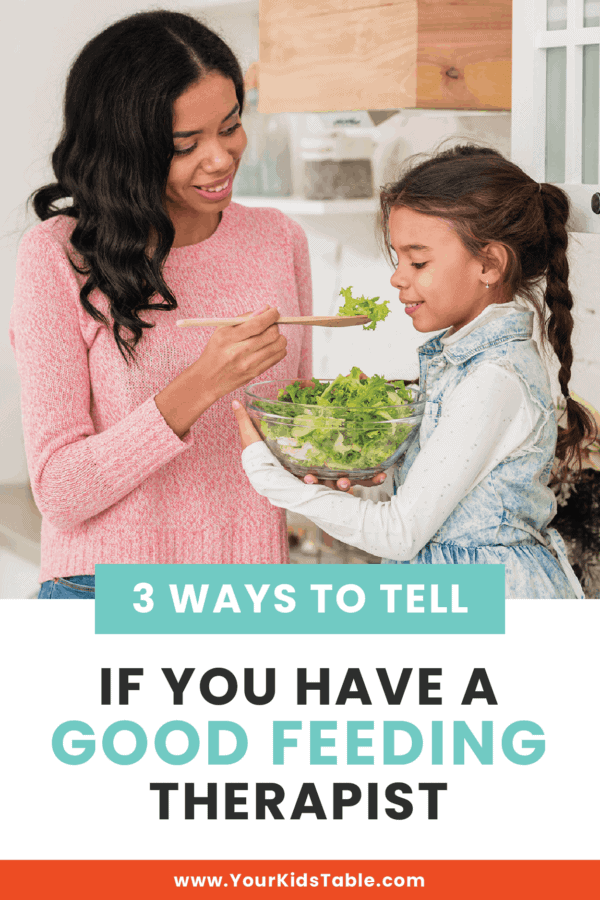Got a feeding therapist? Need one? Or, maybe you are one? Learn 3 things every good feeding therapist does in feeding therapy, and what to do if a feeding therapist isn’t working out.
Some kids are extreme picky eaters and mealtimes are stressful. They may only eat a few foods or can’t stand certain textures. Kids can also have difficulty chewing and swallowing. In any of these cases, feeding therapy could help them learn how to eat and enjoy other foods.
On our recent Your Kid’s Table survey, a new feeding therapist asked me….
“I want to know from parents who have gone through feeding therapy… what were the pros and cons. Obviously each child is different, approaches are different, providers handle things differently, but I’m hoping to hear from the parents (or what you’ve heard from parents) about what didn’t work for them. I’m hoping to compile a “list” to watch out for and make sure to address with my own clients’ families as I am VERY new to the world of feeding therapy.” Kelly, SLP
Yes, girl! Love that you’re wanting to provide the best support to families.
This is an excellent question, for both parents and therapists. In this post, you’ll discover my detailed answer and 3 specific ways to know if you have a good feeding therapist!
How Does Feeding Therapy Work?
Feeding therapy can happen in your home through state early intervention programs for children typically 0-3 years old, but sometimes up until age 5. This varies widely by state, but asking your pediatrician or Googling “early intervention” in your state is a good place to start.
Traditionally, and most commonly, feeding therapy either happens at a local children’s hospital, clinic, or a private practice. Occupational therapists, like myself, as well as speech and language pathologists and sometimes nutritionists, are feeding therapists.
Typically, you have a 1-hour appointment once a week where a therapist works with your child to help the improve their eating. This is usually one on one in a room with a therapist, a child, and some food. In some models, parents are present for feeding therapy, in others, you may be in a waiting room or watching through a one way mirror.
We have a detailed post all about feeding therapy, if you want to learn more head to Everything You Need to Know About Feeding Therapy.
Pros and Cons of Feeding Therapy From a Parent’s Perspective
Of course, as an occupational therapist that has done A LOT of feeding therapy, I think it’s fantastic. I’ve seen it absolutely transform the way a child eats. When feeding therapy is working well, you can expect it to:
- Help parents feel supported and less isolated in the struggle of picky eating
- Give parents specific tools, tips, and strategies they can use to help their child eat at mealtimes
- Provide the most beneficial activities for a child to overcome underlying difficulties that cause eating difficulties like oral motor skills and sensory sensitivities.
Over the years, I’ve had some families feel frustrated by feeding therapy, including my own sister while she was trying to help her daughter with Turner’s Syndrome learn to eat. (You can read more about their journey weaning from a g-tube here.) So, while I haven’t been on the receiving end of feeding therapy, I’ve heard more than enough over the years to answer Kelly’s question about what the cons of feeding therapy are, from a parent’s perspective:
- Their child will eat new foods in feeding therapy, but won’t at home or without the therapist
- Feeding therapy is very stressful for their child
- It’s only once a week and they need more help.
These are all valid concerns and parents may have to work to fill in some of these gaps.
But, there are a few other feeding therapy cons that are truly dependent on the approach and personality of the therapist/clinic. Parents have shared with me that sometimes they feel:
- They don’t learn strategies they can use at home or aren’t sure what to do between feeding therapy sessions
- They don’t understand the tools or strategies being used in therapy
- The therapist doesn’t seem confident or have the necessary skill set
- The therapist is overly confident and pushing an approach that the parents aren’t comfortable with.
Each of those are red flags to watch out for in feeding therapy. If you’re ever feeling that way, it’s important to address it, I’ll show you how in a few minutes.

What Makes a Feeding Therapist?
Even though many children struggle to eat well and easily, feeding therapy is a specialty among all the professions I listed above. I’ve never met a therapist that graduated with their degree knowing detailed feeding strategies and approaches.
A therapist must take specialized courses AFTER they graduate to know how to effectively treat feeding difficulties in children. Then, they have to have experience in using those strategies to expertly guide parents through these often difficult feeding challenges.
I’m sure you can imagine that doesn’t always happen. I hate to think of all the stories I’ve heard when feeding therapy “didn’t work” for a child. It breaks my heart because a parent has reached out for more help and when it doesn’t work, it often leaves them feeling more hopeless.
Are You Comfortable With the Feeding Therapist’s Approach?
While there are lots of different strategies and methodologies for feeding therapy, for me, it boils down to 2 main approaches.
1.A traditional behavior approach where children are rewarded for trying new food with sweets, electronics, stickers, etc.
2.A positive approach where children learn to want to eat by removing pressure.
Some therapists will blend these two styles, but when calling different clinics, early intervention, or your local hospital, it’s acceptable to ask what approach they use and decide if you’re comfortable with that.
If you’re a student or regular reader here, you know that I’m firmly in the second camp, but I respect and understand why some therapists still use the first rewards driven approach.
Since children may cry a lot or be strongly coaxed to eat with the first approach, many parents are uncomfortable with it because their child may be visibly stressed. It’s also okay to talk to your therapist about your concerns before beginning treatment.

3 Ways to Tell If You Have a Good Feeding Therapist
There are lots of wonderful attributes about great feeding therapists, but I wanted to boil the most essential down to help you if you’re questioning if you’re on the right track with your feeding therapist. I believe there are three important qualities to look for:
#1: Confident in Knowledge
Probably the biggest complaint I hear from parents is that they aren’t sure their feeding therapist has the necessary experience to help their child. In other words, they don’t feel confident. And, as I listen to concerns, it becomes obvious to me that the therapist doesn’t feel very confident either because they have difficulty answering questions or giving guidance for at home instruction.
Or, their answers are vague.
Sometimes you’ll take your child to an OT for feeding and you’ll find them working on fine motor skills, which is classic occupational therapy that most OT’s have a working knowledge of. That’s another red flag if it’s not why you’re in therapy.
But, if your feeding therapist offers explanations for why certain strategies are being used, and answers your questions directly, then that’s a very good sign. You should also hear them talking about why your child is a picky eater and working to address that.
#2: Communicates With Parents
It’s tough for most feeding therapists to have enough time to talk with parents during a therapy session, most insurance guidelines dictate that the time has to be spent in direct therapy with the child. However, with coverage having decreased, if you’re paying out of pocket for feeding therapy, you can ask for time to discuss what you should be doing at home.
Ideally, they have helpful handouts that you can read, share, and reference throughout the week.
Even if there isn’t a lot of time, your feeding therapist should give you specific homework or clear next steps for home. Because let’s face it, feeding therapy is only an hour a week, to make real changes, your child will need consistency outside of therapy too!
A good feeding therapist should also be happy and available to answer any questions you have.
#3: Patient with Your Child
If you have a picky eater, then you know how frustrating it can be to feed them, but a feeding therapist should never show any frustration to your child.
Instead, you should see extra patience and consideration for your child’s needs. Bonding with the feeding therapist increases progress, because your child trusts them.
When your child reaches a stumbling block you should see your feeding therapist able to adapt, pivot, and look for other solutions to help them overcome the issue. For instance, let’s say the feeding therapist brings out pudding as a food and your child goes ballistic. They cry and run from the table.

A good feeding therapist will see that the pudding was too much for them. They might then offer a brief calming activity, reassure them that they’ve put the pudding back in the kitchen, or give them a hug. Then, they might try something easier for your child to give them a sense of accomplishment before reintroducing the pudding another day or in a different way (like using a paint brush to paint with pudding!)
What You Can Do If You Don’t Have a Good Feeding Therapist
If you find yourself questioning your therapist and aren’t sure they’re a good fit for your child, it’s okay. It’s normal to feel bad, but it’s important to explore your concerns so that you can ensure your child is getting the help they need.
These are the steps I’d recommend taking:
1. Talk to the feeding therapist – sometimes it’s a simple miscommunication, and they can make some simple changes so that you’re comfortable or understand what they’re doing.
2. Talk to the feeding therapist’s supervisor – if you’ve tried talking directly to your child’s feeding therapist and felt your concerns or questions weren’t addressed, it’s a good idea to call their supervisor to explain your concerns. Sometimes, the supervisor is the office manager of a clinic, or in an early intervention situation, it would be the case manager. If you’re unsure, you can always contact the secretary for more guidance.
3. Look for a new clinic/provider – if you’re still not seeing any change, it’s okay to cancel your services and look for a new therapist at a different facility. Hopefully it doesn’t have to come to that though.
Getting More Support at Home
If you’re looking for more support at home, either to prevent feeding therapy or to help fill in the gaps for strategies at home, check out our free workshop:
3 Keys to Turn Around Picky Eating
You’ll get three powerful strategies that can help your kid begin eating new foods, and you’ll also learn about my 5 Mealtime Works steps! Click here to get a seat.
More Help for Picky Eaters
How to Prevent Siblings From Becoming Picky Eaters, Too
Take the Test: What Type of Picky Eater is Your Child?
A Weird but Effective Trick for Picky Eaters
Perfect Lunch Ideas for Picky Eaters at School, Home, or Daycare
Alisha Grogan is a licensed occupational therapist and founder of Your Kid’s Table. She has over 15 years experience with expertise in sensory processing and feeding development in babies, toddlers, and children. Alisha also has 3 boys of her own at home. Learn more about her here.

How do you suggest dealing with feeding therapy appointments virtually? With COVID, no one will visit us in person anymore. Any tips for getting the most out of the sessions like that?
Hey Sasha,
I’d still be looking for the same set of skills and confidence and looking for some coaching from the therapist to help you help your child with whatever they are dealing with. Making sure that you discuss the next session and what you may need to have ready or have any part of your house set up like. I’d say more open discussion can be key to successful virtual appointments.
Best,
Desiree